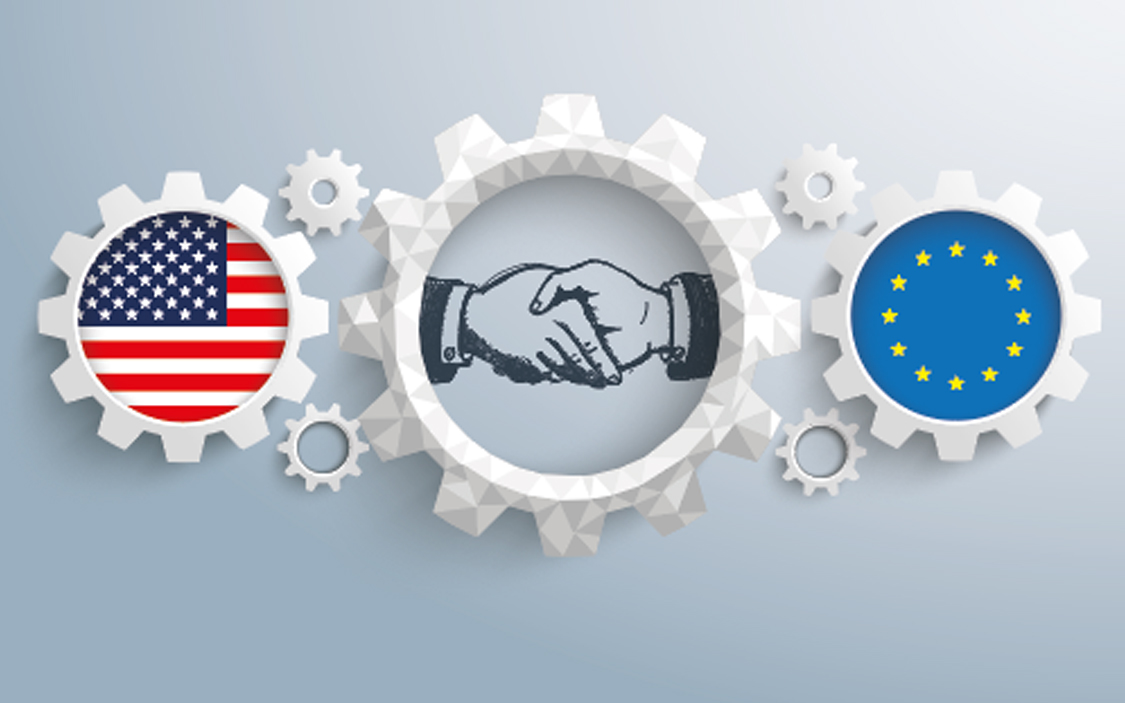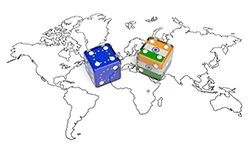BusinessEurope Headlines No. 2023-07
Transatlantic business remains committed to an ambitious EU-U.S. Trade and Technology Council

On 23 February, BusinessEurope organised a meeting with the U.S. Chamber of Commerce to have an exchange of views on shared priorities and possible joint activities ahead of the next the EU-U.S. Trade and Technology Council (TTC) ministerial meeting, to be held in Sweden in late spring. Transatlantic business remains committed to an ambitious and productive TTC, however it is important that it delivers swiftly on key priorities for companies. Regulatory cooperation has long been identified as a crucial area where benefits could materialise for a number of sectors, whether through the expansion and enhancement of mutual recognition agreements or by making conformity assessment processes more efficient, reducing whenever possible the regulatory burden on public authorities and companies. Stakeholders look forward to a meaningful engagement with policy-makers on both sides of the Atlantic to ensure the TTC’s ambitious objectives can be achieved.
![]() Contact: Eleonora Catella
Contact: Eleonora Catella
Industrial Emissions Directive must reduce regulatory burden while supporting industrial transformation
 “The revision of the Industrial Emissions Directive provides a real opportunity to achieve a true reduction of the regulatory burden while supporting the transformation of industries towards the Green Deal’s objectives”, stated BusinessEurope in a letter to the Swedish Minister for Climate and the Environment, Romina Pourmokhtari, ahead of the Environment Council on 16 March. However, in its current form this revision is adding complexity, duplications with existing legislations and legal uncertainties. Ultimately, it risks delaying the permitting procedures and slowing down instead of accelerating the greening of industries in Europe. BusinessEurope calls on ministers to amend the proposal substantially, so that it does not become an instrument of micro-management of European industry but will truly support its transformation.
“The revision of the Industrial Emissions Directive provides a real opportunity to achieve a true reduction of the regulatory burden while supporting the transformation of industries towards the Green Deal’s objectives”, stated BusinessEurope in a letter to the Swedish Minister for Climate and the Environment, Romina Pourmokhtari, ahead of the Environment Council on 16 March. However, in its current form this revision is adding complexity, duplications with existing legislations and legal uncertainties. Ultimately, it risks delaying the permitting procedures and slowing down instead of accelerating the greening of industries in Europe. BusinessEurope calls on ministers to amend the proposal substantially, so that it does not become an instrument of micro-management of European industry but will truly support its transformation.
![]() Contact: Viktoria Bartolome
Contact: Viktoria Bartolome
Intellectual property infringements are a concern for businesses
 More than 10% of European SMEs whose intellectual property rights have been infringed do not enforce their rights. This is one of the conclusions of a study jointly performed by the European Union Intellectual Property Office (EUIPO) and Organisation for Economic Co-operation and Development (OECD) on the risks of illicit trade in counterfeits for small and medium-sized enterprises (SMEs). “This points to the complexity, length and costs of enforcement procedures”, said BusinessEurope Senior Adviser Elena Bertolotto. She joined the private sector meeting of the European Observatory on Infringements of Intellectual Property Rights on 28 February in Brussels, where the study was presented. Bertolotto highlighted that “we welcome these studies as they help raise awareness and keep the debate alive on these important issues”. She added that this is a very concerning trend, which deserves further consideration at both regulatory and political levels.
More than 10% of European SMEs whose intellectual property rights have been infringed do not enforce their rights. This is one of the conclusions of a study jointly performed by the European Union Intellectual Property Office (EUIPO) and Organisation for Economic Co-operation and Development (OECD) on the risks of illicit trade in counterfeits for small and medium-sized enterprises (SMEs). “This points to the complexity, length and costs of enforcement procedures”, said BusinessEurope Senior Adviser Elena Bertolotto. She joined the private sector meeting of the European Observatory on Infringements of Intellectual Property Rights on 28 February in Brussels, where the study was presented. Bertolotto highlighted that “we welcome these studies as they help raise awareness and keep the debate alive on these important issues”. She added that this is a very concerning trend, which deserves further consideration at both regulatory and political levels.
Contact: Elena Bertolotto
EU and India deepen relations in light of rapidly changing geopolitical environment
 BusinessEurope published a letter on 1 March on recent developments between the EU and India, notably the launch of the EU-India Trade and Technology Council (TTC) on 6 February and the ongoing trade and investment negotiations. In a rapidly changing geopolitical environment, European businesses welcome the deepening of bilateral relations with India as companies seek to diversify and reduce dependencies from dominant players. BusinessEurope’s letter highlights the TTC as a welcomed initiative, especially its prioritisation of three main areas: the green and digital working groups as well as the working group on trade; investment and resilient value chains with a focus on the international and global dimensions; and cooperation on geopolitical challenges. The letter also highlights the importance of the EU-India trade and investment negotiations as BusinessEurope’s top priority in EU-India relations, underlying that the TTC and trade negotiations should remain as two separate processes and that the former should not take space of the latter. “We are conscious of the difficult exercise to achieve a comprehensive agreement, not least because of the tight deadline of finalising the negotiations by the end of this year. As negotiations progress, a further assessment might be needed as to the level of ambition that can be reasonably achieved in the timeframe the two sides have agreed on”, the letter concludes.
BusinessEurope published a letter on 1 March on recent developments between the EU and India, notably the launch of the EU-India Trade and Technology Council (TTC) on 6 February and the ongoing trade and investment negotiations. In a rapidly changing geopolitical environment, European businesses welcome the deepening of bilateral relations with India as companies seek to diversify and reduce dependencies from dominant players. BusinessEurope’s letter highlights the TTC as a welcomed initiative, especially its prioritisation of three main areas: the green and digital working groups as well as the working group on trade; investment and resilient value chains with a focus on the international and global dimensions; and cooperation on geopolitical challenges. The letter also highlights the importance of the EU-India trade and investment negotiations as BusinessEurope’s top priority in EU-India relations, underlying that the TTC and trade negotiations should remain as two separate processes and that the former should not take space of the latter. “We are conscious of the difficult exercise to achieve a comprehensive agreement, not least because of the tight deadline of finalising the negotiations by the end of this year. As negotiations progress, a further assessment might be needed as to the level of ambition that can be reasonably achieved in the timeframe the two sides have agreed on”, the letter concludes.
![]() Contact: e.suarez@businesseurope.eu
Contact: e.suarez@businesseurope.eu
Businesses welcome the proposals on design legislation
 We recently published our comments on the European Commission proposals which are intended to further harmonise the legislation on design protection in the European Union. Elena Bertolotto, Senior Adviser at BusinessEurope stated that “our members welcome these initiatives, which are intended to modernise the legislation on designs protection and render it fit for the digital age”. Designs traditionally are the least used type of intellectual property rights, however they play an important role for businesses and the EU economy as a whole. “We are confident that the reform could contribute to increasing awareness about design protection and help increase the usage of protected designs, especially for smaller businesses”, Bertolotto added.
We recently published our comments on the European Commission proposals which are intended to further harmonise the legislation on design protection in the European Union. Elena Bertolotto, Senior Adviser at BusinessEurope stated that “our members welcome these initiatives, which are intended to modernise the legislation on designs protection and render it fit for the digital age”. Designs traditionally are the least used type of intellectual property rights, however they play an important role for businesses and the EU economy as a whole. “We are confident that the reform could contribute to increasing awareness about design protection and help increase the usage of protected designs, especially for smaller businesses”, Bertolotto added.
![]() Contact: e.bertolotto@businesseurope.eu
Contact: e.bertolotto@businesseurope.eu
Companies must deal with geoeconomic risks due to increasing state rivalry
 European companies must consider geoeconomic risks in their supply chains in a growingly challenging international environment. In this new period of increasing economic state rivalry, the traditional risk analysis based on competition among companies in a neutral and rules-based order is falling short. Economic interdependence, once considered as a positive objective, starts to be perceived as a danger by governments especially in sectors considered to be strategic. This leads to more policies aimed at favouring local production, decoupling from Russia and mitigating dependencies on China. Public-private partnership is underpinned as a key aspect to detect risks, find the adequate solutions, and outline strategic interests. These were the main conclusions of the webinar on geoeconomic risks organised by BusinessEurope on 28 February, with Heiko Borchert from Borchert Consulting & Research AG and Professor Mikael Wigell, Research Director at the Finish Institute for International Affairs, as keynote speakers.
European companies must consider geoeconomic risks in their supply chains in a growingly challenging international environment. In this new period of increasing economic state rivalry, the traditional risk analysis based on competition among companies in a neutral and rules-based order is falling short. Economic interdependence, once considered as a positive objective, starts to be perceived as a danger by governments especially in sectors considered to be strategic. This leads to more policies aimed at favouring local production, decoupling from Russia and mitigating dependencies on China. Public-private partnership is underpinned as a key aspect to detect risks, find the adequate solutions, and outline strategic interests. These were the main conclusions of the webinar on geoeconomic risks organised by BusinessEurope on 28 February, with Heiko Borchert from Borchert Consulting & Research AG and Professor Mikael Wigell, Research Director at the Finish Institute for International Affairs, as keynote speakers.
Contact: Alvaro Schweinfurth
Calendar 
- 18 April: VAT in the digital age: digital / real-time reporting - Implications for businesses and compliance processes
- 6 June: Reuters Event: Responsible Business Europe 2023
- 14-15 June: International IP Enforcement Summit
- 19-20 June: TDI23 – Day of Industry
Not yet a subscriber? Register here.
Reminder: please have a look at our privacy policy